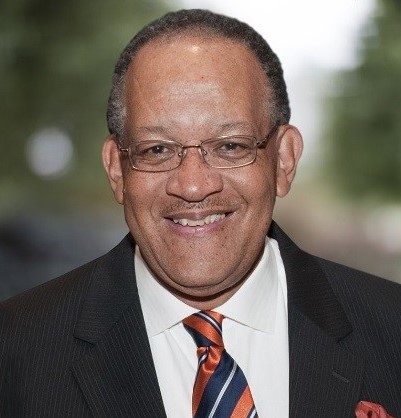Richard Payne, MD

August 24, 1951 – January 3, 2019
Our colleague and friend, Dr. Richard Payne, 67 – internationally recognized expert in neurology, oncology, pain management, palliative care and bioethics – died January 3 from complications related to a recent cancer diagnosis.
“Do You Know My Richie?”
Richard’s association with the Center for Practical Bioethics began in the mid-90s when Myra Christopher, then President and CEO of the Center, met Richard’s wife Terrie at a conference featuring end-of-life discussions. Terrie approached asking, “Do you know my Richie?” That was the only spark needed to ignite a quarter century of friendship and collaboration with the Paynes.
The couple worked with the Center on multiple fronts including serving as advisors on the Center’s multi-state Community State Partnerships project to improve end-of-life care, assisting in the development of medical education to improve physician care for those facing serious illness and critical outreach efforts to engage more diverse groups of clinicians in dealing with underserved and disaffected populations, especially those of color. Richard’s assistance and expertise in reaching African American physicians provided the guidance and engagement that enabled the local Kansas City Pathways initiative to demonstrate that true success can only be measured when patients and families of all classes, races and faiths are served through a diverse, multidisciplinary, integrated community-wide approach.
John B. Francis Chair
Richard was named the John B. Francis Chair at the Center for Practical Bioethics in January 2013, having just completed his sixth year in that role at the time of his untimely death. During his tenure, he directed projects focused on how access to care and health decision making among underserved Americans impacts care delivery and patient outcomes. He also led the Center’s exploration and responses in emerging ethical issues such as genetic engineering (CRISPR), expanded access for drug treatment and public/private partnerships, collision sports, and medical professionalism.
“Rich’s interest in advance care planning targeted the underserved, examining the role that faith communities perform in providing nurturing relationships and trusted messengers especially among patients and families who have suffered discrimination or been ill-served by the health care system,” said John Carney, President and CEO of the Center. “His keen insights into how disaffected populations interact with providers especially in developing goals of care and making treatment decisions was informed by his extensive personal experience in dealing with those living with serious illness, pain, and chronic conditions from all walks of life.” Richard had also served as medical director for the Pain Action Alliance to Implement a National Strategy (PAINS Project).
In July 2017, Richard transitioned from his position as the Esther Colliflower Professor of Medicine and Divinity at Duke Divinity School to emeritus status. He had until quite recently served on two National Academies of Medicine Committees, most recently on the Health Sciences Policy Board of the National Academies of Sciences, Engineering and Medicine.
Career Highlights
Richard received his BA in molecular biophysics and biochemistry from Yale University and his MD from Harvard Medical School. He completed post-graduate training in medicine at the Peter Bent Brigham Hospital in Boston and in neurology at New York Presbyterian Hospital, as well as fellowship training in pharmacology, neuro-oncology and pain medicine at Weill Cornell Medical School and Memorial Sloan Kettering Cancer Center. He was board certified in neurology with added qualification in pain management and palliative medicine.
At the Duke Medical Center, Richard served as Faculty Associate of the Trent Center in Bioethics and as a member of the Duke Cancer Center. He also served as the director of the Duke Institute on Care at the End of Life from 2004-2012.
Prior to his appointment at Duke and the Center for Practical Bioethics, Richard served as Chief, Pain and Symptom Management Section, Department of Neurology at MD Anderson Cancer Center and subsequently led the Pain and Palliative Care Service at Memorial Sloan-Kettering Cancer Center. He was also Professor of Neurology and Pharmacology at Cornell University Weill Medical College.
Through his career, Richard served on numerous boards, presented dozens of endowed lectures, published more than 275 scholarly articles and edited four books. At the time of his death, he served on the Board of Directors of the Hastings Bioethics Center, where he chaired a selection committee for the Hastings Center Cunniff-Dixon Physician Excellence Awards in End of Life Care. He was a member of the Interagency Pain Research Coordinating Committee of the National Institutes of Health.
“Rich Payne will be missed by the thousands who knew him and were inspired by his conviction, commitment and spirit,” said Carney. “He will also be unknowingly missed by millions who never met him, but whose care will be better because this one man dedicated his life to all that good medicine stands for.”
The Center extends heartfelt condolences and prayers to Richard’s beloved wife Terrie, son Rich, Jr., daughter Susan, and spouses, along with four young grandchildren (Tripp, Sloan, Justus and Zara) and loving extended family. The family requested tributes and donations to the American Cancer Society Mosaic Memorial Tributes & Donations or the charity of your choice.
Inaugural Dr. Richard Payne Palliative Care Leadership Award Recipient Announced
The Hastings Center, in collaboration with the Cunniff-Dixon Foundation, announced on May 17, 2022, the winner of the first bi-annual award in honor of the Center’s late beloved John B. Francis Chair, Dr. Richard Payne.
The new award recognizes physicians who have built palliative care for marginalized and underserved communities. Shellie Williams, MD, Associate Professor of Medicine at the University of Chicago, who will receive $25,000 in prize money, practices geriatric and palliative medicine. Her clinical focus is primarily with aging dementia patients in underserved communities in Chicago’s South Side and on addressing access and education disparities for patients of color and their caregivers.
An Interview with Richard and Terrie Payne


